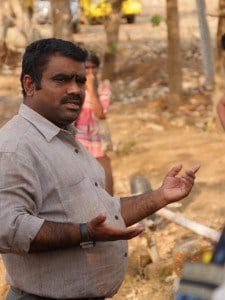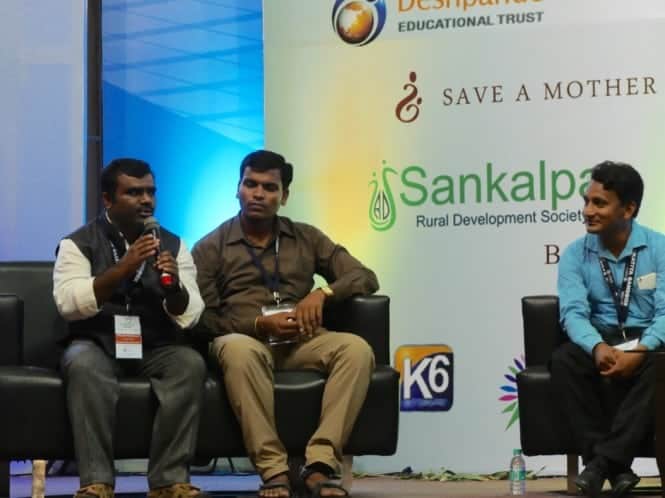 Mr. Sikandar Meeranaik is an entrepreneur in the field of modern-day rainwater harvesting.
Mr. Sikandar Meeranaik is an entrepreneur in the field of modern-day rainwater harvesting.
Sikandar was born and brought up in a small village called Kotumachagi in the Gadag District which is an area that is prone to drought. At those times there were often problems with supply from the government taps and then the villagers had travel 3 -4 kms to take drinking water from the farm ponds.
As he grew up Sikander looked around his dried up village and asked himself this driving question: ‘What can I do to help the people of this village to have a better life?”
First he set out to study, completing his Bachelor of Social Work at the Karnataka University Gadag Branch- he then joined a government agency who were involved in water projects and building various structures for water management including bunds, toilets etc. in the Haveri district. He worked with them for one and half years before moving to an organisation in Bangalore who were doing rain water harvesting. They introduced Sikandar to the Deshpande Foundation in Hubli where he first met Naveen Jha the CEO of that Foundation.
This was a big turning point for Sikandar as Naveen saw the passion in his eyes and encouraged him greatly – first to join the Deshpande Social Entrepreneurship Program where he studied for 6 months learning valuable tools (such as English and computer skills) for the future of his own enterprise. Naveen continued to mentor Sikandar and assisted him to begin the Sankalpa Rural Development Society. This NGO is the platform from which Sikandar has refined and discovered better ways to bring water to the parched lands and the dried up bore wells.
He experimented with existing water harvesting methods and through trial and error he developed a unique form of rain water bore well recharge system which is cost effective, permanent and easy to implement. He has gone on to assisting over 2100 farmers with a proven and economical solution to their water difficulties.
Instead of allowing the bore wells which are drying out to be rendered useless, SRDS converts them into useful recharge structures.
Sikandar has a guiding dream. He keeps fixed in the forefront of his mind and his work that by 2030 water scarcity in India will be a thing of the past. He envisages creating 1000 bore well recharge systems per year and that this simple easily installed technology will spread to all the surrounding districts. He sees his role as helping people to understand this system so that they can build it themselves and the spread will become vast. Sikandar has devised a method of reducing the cost of constructing the water harvesting structures and has brought reduced the cost of construction by 60% in rural and 50% in urban area.
Sikandar says:
“I believe in order to have enough water for all for the continuation of a good life we must give it back to the earth. We cannot go on always taking without giving back and not suffer the consequences.”
Education of the farmers and the villagers is an important part of his work. To support the rural rain water harvesting projects Sikandar also implements this technology in urban areas – for housing societies as well as rooftop rainwater harvesting projects for industry. He has also established a network of 600+ Self Help Groups through the support of the ICICI Bank – using the model of microfinance for village women – this network has given a method to contact the farmers and spread the word about Rain water harvesting while helping their wives to become self supporting.


